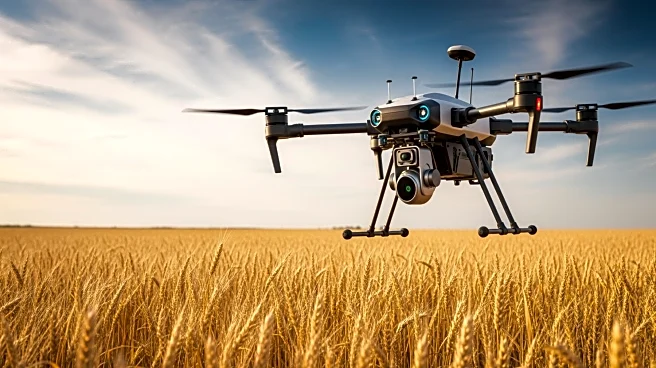What's Happening?
Farmonaut is addressing significant challenges in global wheat farming, particularly the threat of rust diseases and climate-induced stresses. As of 2025, wheat rust outbreaks threaten over 40% of the global harvest
due to shifting climate patterns. Farmonaut's platform offers advanced solutions such as satellite-based monitoring, AI-driven advisory systems, and blockchain traceability to enhance wheat farming resilience. These technologies enable early detection of rust outbreaks, optimize treatment timing, and ensure transparency in the supply chain. The platform is accessible via web, Android, and iOS apps, making precision agriculture tools scalable for farms of all sizes.
Why It's Important?
Wheat is a crucial staple crop, feeding billions worldwide and supporting various industries. The resilience of wheat farming is vital for global food security and economic stability. Farmonaut's innovations in disease management and climate adaptation are essential for sustaining wheat production amid increasing environmental pressures. By integrating digital monitoring and sustainable practices, Farmonaut helps farmers mitigate risks, improve yields, and reduce reliance on chemical inputs. This approach not only enhances food security but also supports environmental sustainability and economic resilience in the agricultural sector.
What's Next?
Farmonaut's continued development of technology-driven solutions will likely lead to broader adoption of integrated disease management practices in wheat farming. As climate patterns remain volatile, the emphasis on sustainability and real-time monitoring will grow. Investments in research and breeding for rust-resistant and drought-tolerant wheat varieties are expected to intensify. The adoption of blockchain traceability will become more widespread, ensuring product authenticity and quality. These advancements will support the wheat sector's robustness and productivity through 2026 and beyond.
Beyond the Headlines
The integration of AI and blockchain in agriculture represents a significant shift towards more transparent and efficient farming practices. These technologies not only address immediate threats like rust but also contribute to long-term sustainability by reducing environmental impact and enhancing resource management. The ethical implications of such innovations include improved food security and equitable access to agricultural technology for smallholder farmers, fostering a more resilient global food system.









